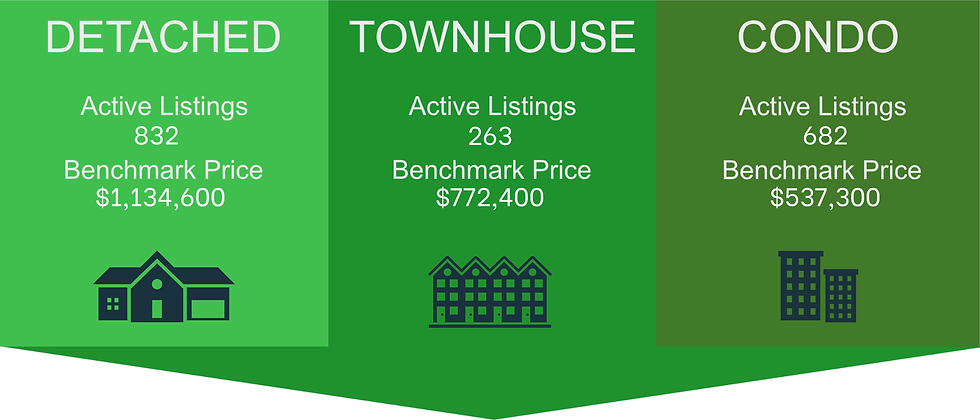Market Insight Series - August 2022
- Aug 5, 2022
- 3 min read
What does the current Victoria real estate market look like?

As part of our monthly Market Insight Series, I am excited to continue to bring you regular insights into the Victoria and Vancouver Island market trends, so you can make better buying and selling decisions. Below I will jump into the most important market numbers to look into, I will provide glossary term definitions, and will conclude with resources if you want to further research current trends and stats. If you want to see what the Market Insight for the previous month was, click here.

July's sales numbers are now in, with a total of 510 sales for the month, down 38.9 percent from 835 home sales one year ago in July 2021. Similarly the current absorption rate is still declining, but much slower than before and has now settled at 30% (about a 7% decline from the previous month versus the average 20.75% from recent prior months).
This still puts us in the range of a seller's market for the time being, but keep in mind this is last month's data. Since this information is always lagged by a month, it could be that we have already entered a balanced market. This could be due in part to the fact that the US federal reserve is beginning to slow its interest rate increases. For example the most recent Fed interest rate increase was only 0.75% rather an anticipated 1% increase. If this is true other central banks like the Bank of Canada are likely to follow suit with slowing interest rate increases as well.
Below is a table that outlines the current housing benchmark pricing along with a sample calculation that can give you an idea of what it might cost you to own a home.

The primary importance of these interest rate changes is their affect on supply and demand. As interest rates rise, so does the cost of borrowing which makes monthly mortgages more expensive. This causes potential buyers to pause and reconsider their decision to purchase. For many the increased cost is making potential buyers press pause on their property search for the time being, others are exiting the market altogether. The result is falling demand and cheaper prices for those still in the market.
In the mean time, although the current trend continues, it does appear to be slowing down in the short term. If central banks including the Bank of Canada begin taking a less hawkish approach to the market we could see the rise in mortgage rates slow down this year and possibly an eventual reversal of interest rates in the longer term (i.e. 2023 or 2024).
As for supply and demand, if the decline in demand continues to slow down we may see a smoother landing somewhere between a balanced market and a slight seller's market over the next few months rather than the aggressive crash that some are predicting.
Opportunities for ordinary people looking to get into their first home, or move up into one of the more affordable homes that are in and around the $1M or less range are still out there, it just takes a bit more diligence, and ideally the support of a committed agent.
Conclusion
The goal is to give you insight into what the overall market view looks like in Victoria and Vancouver Island. I have included more Resources below so that you can dive in and read more at your leisure. I will also make sure to include a new Glossary Term each month, and define it to add to your knowledge of common industry terms.
Feel free to contact me if you want to learn more or if you have any questions about the broader market trends.
Glossary Term
Benchmark Price
The value of a “typical” home in a community, based on the most popular combination of features, e.g., age, size, number of bedrooms and bathrooms. You’ll find separate benchmark prices for detached, attached and condo homes.
Read More: https://www.rew.ca/news/benchmark-vs-average-vs-median-what-s-the-difference-1.2096130 & https://www.creb.com/Housing_Statistics/Understanding_housing_statistics/Glossary_of_Terms/
Resources
1. VREB Insight:
2. Mortgage Calculator:
3. Mortgage Rate By Bank:



Comments